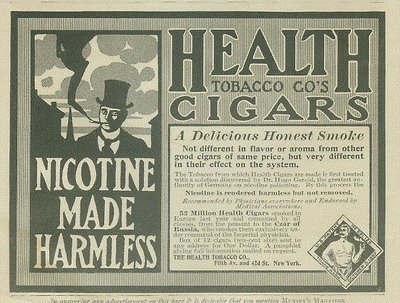Persons who deliberately inhale cigarette smoke are known as smokers, and those who use e-cigarettes are called vapers. But what about people who obtain their regular supply of nicotine from skin patches or chewing gum? Should we call them patchers and chewers, respectively?
I propose, in order to simplify the terminology as well as more accurately to reflect the reality of what these unfortunate people apparently feel compelled to do themselves all day, that henceforth all users of nicotine in whatever form should be known for what they are: nicotine addicts.
Now let’s turn to an article that appeared last month in The British Medical Journal and was widely reported in the media. It was titled, ‘Just one cigarette a day increases cardiovascular (stroke and heart attack) risk.’
How many people smoke only one cigarette a day? There’s a very small minority of smokers who only do it only occasionally, such as once a week or on special occasions. But of the hundreds of smokers I’ve treated, none smoked only one cigarette a day – they all smoked at least three and often five, ten, fifteen, twenty, or more every day.
The above-mentioned article is merely underlining the obvious: smoking is dangerous and the more you smoke the more dangerous it is. Or to put it another way, cutting down the number of cigarettes smoked daily, even if it’s to only one, won’t help you very much to avoid a stroke or heart attack compared with a not smoking at all. (Cutting down may, however, reduce your risk of cancer.) This amounts to another attempt, tedious in its repetitiveness, to frighten smokers into quitting.
Apart from that, what is interesting about this long scholarly article (it’s over 9,000 words and lists 127 references) is what it doesn’t say: there’s not one mention of nicotine addiction.
There’s an accompanying commentary on this paper in which the word ‘addict’ appears once, but it’s in the context of the suggestion that the ‘marketing of supposedly safer tobacco products seems to recruit and addict new generations of young smokers.’ This is worrying enough, but note that the writer only says people can become addicted to smoking, not that smoking is nicotine addiction.
It’s worth quoting further from the commentary:
About 900 million people smoke worldwide. If trends continue, an estimated one billion premature deaths from smoking will occur this century. Cardiovascular disease, not cancer, is the greatest mortality (death) risk for smoking.
Light smoking, occasional smoking, and smoking fewer cigarettes all carry substantial risk of cardiovascular disease.
Passive smoking is essentially another form of low dose smoking that carries a substantial cardiovascular risk.
Electronic cigarettes and heat-not-burn cigarettes, may carry substantial risk for heart disease and stroke. Although e-cigarettes deliver reduced levels of carcinogens (cancer-causing chemicals) they still expose users to high levels of ultrafine particles and other toxins that may markedly increase cardiovascular risk. Somewhat lower emissions of many toxic substances from heat-not-burn cigarettes do not make these products safe…We cannot afford to wait several more decades to document the illness, disability, and deaths caused by new recreational tobacco and nicotine products.
Too true, but why cannot even the writer of this scholarly piece, Professor Kenneth C. Johnson of the University of Ottawa, seem to understand that using tobacco and other nicotine products is not a recreational activity: it’s drug (nicotine) addiction.
In the same edition of The British Medical Journal there’s an opinion piece in reference to people addicted to ‘hard’ drugs, that avoiding terms like ‘junkie’ or ‘crackhead’ in favour of ‘persons with drug dependence’ or ‘person with substance use disorder’ is not enough if underlying dismissive or disparaging attitudes are unchanged.
Quite right that persons with substance use disorders should be treated with respect. But smokers, vapers, patchers, and chewers are not in general, or even in many medical papers, recognised as having a disorder: it’s a habit or something that people do for pleasure or relaxation.
If it sounds too blunt to refer to people who, by whatever means, put nicotine into their body repeatedly every day, as drug addicts, how about the more bland but still accurate term: people with nicotine use disorder?
Thus, we could rewrite the last italicised sentence quoted above as: ‘We cannot afford to wait several more decades to document the illness, disability, and deaths caused by new forms of nicotine use disorder.’
So, what should we do then? Professor Johnson doesn’t say, but I shall.
Recognising that smoking and any other way of using nicotine for what it is, namely, drug addiction, requires that legislation be enacted to ban the production and sale of nicotine products. And note that this means abolition, not prohibition.
Text © Gabriel Symonds


Leave A Comment